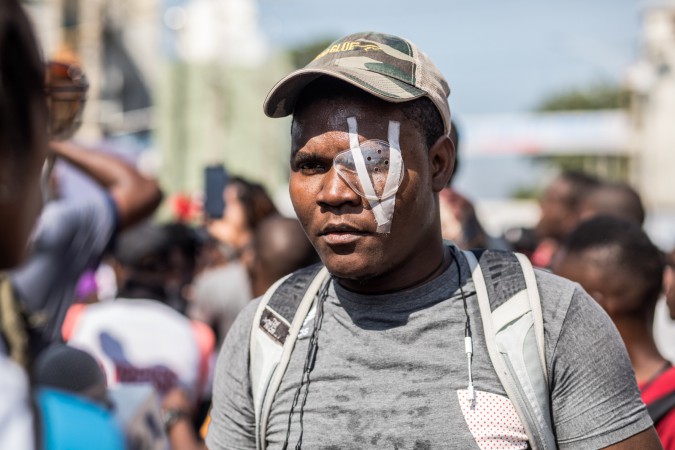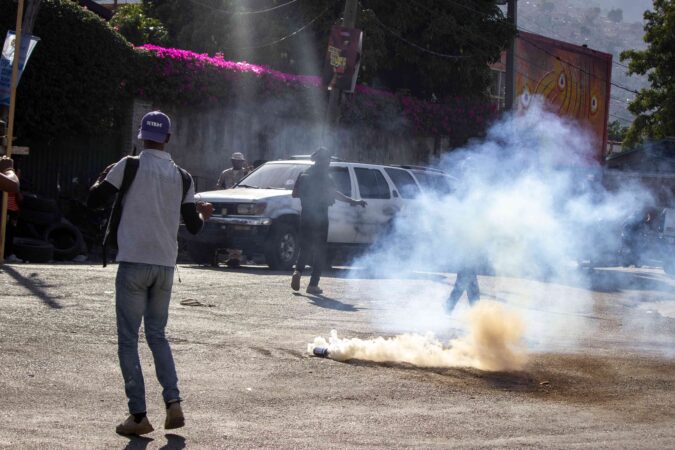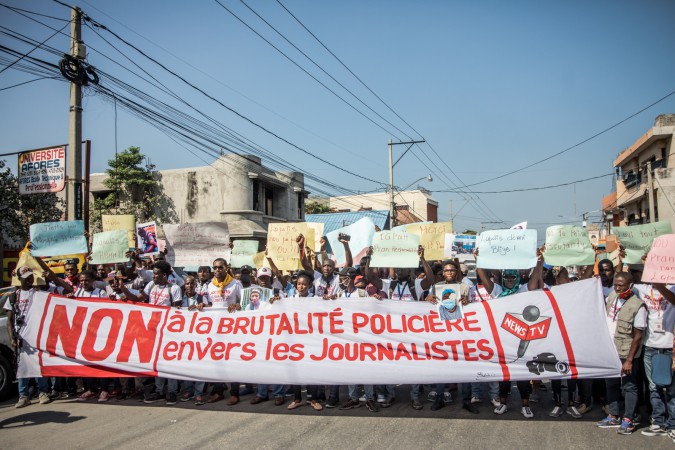The impunity enjoyed by Haitian police officers since the creation of the institution in 1995 raises questions about accountability for the actions of the incoming multinational force
Filing a complaint after police violence achieves practically nothing in Haiti.
This conclusion comes from interviews conducted with 10 victims who sought legal recourse after being attacked over the last decade, as well as analysis from 3 human rights defenders.
Testimonies collected by AyiboPost suggest a climate of almost total impunity within the Haitian National Police (PNH), at a time when an armed force is needed to help fight gangs.
The rules of engagement for the multinational force, to be led by Kenya, are not known.
Nothing indicates whether foreign agents will be able to appear before Haitian courts or before courts outside of the country.
But the impunity that Haitian police officers have enjoyed since the creation of the institution in 1995 raises questions about the accountability of the actions of the incoming multinational force of 2,500 members.
The rules of engagement for the multinational force, to be led by Kenya, are not known.
“We must address the question regarding the responsibility of the forces members as soon as possible to prevent the same mistakes from happening again,” declares Wilkenson Jean-Denis, head of legal affairs at Défenseurs Plus.
Jean-Denis refers to multiple cases of human rights violations committed by foreign soldiers in the country during previous missions, including that of the United Nations which introduced cholera into the country in 2010.
Read also: L’ONU refuse d’assister les enfants abandonnés par les soldats de la MINUSTAH
In 2023, Défenseur Plus alone recorded around 60 cases of violence committed by police officers.
The human rights organization supports most victims in their legal proceedings, but none have been successful to date.
The police — formally called the General Inspectorate of the PNH (IGPNH) — very rarely punishes the offending officers.
The justice system, rendered dysfunctional due to repeated strikes, lack of resources and insecurity, often takes several years before rendering a decision.
Moreover, the vast majority of Haitian police officers do not wear any visible number or symbol allowing them to be identified individually, making any attempt at legal prosecution laborious.
“This disconcerting impunity makes violent police officers more comfortable in their misdeeds,” analyzes Wilkenson Jean-Denis.
The question regarding the responsibility of the forces members must be addressed as soon as possible to prevent the same mistakes from happening again.
– Wilkenson Jean-Denis
However, police violence kills.
Sometimes slowly. Like in February 2015, near the Court of Cassation and Administrative Disputes (CSCCA) on avenue Christophe.
On the sidelines of a student demonstration denouncing the rising price of petroleum products in front of the CSCCA, Chedelet Guilloux, an artist and philosophy student, was apprehended by police officers.
Without proof, according to his peers, Guilloux was accused by agents of having set fire to a bus belonging to the Court.
The accusation resulted in a sentence: Guilloux was violently beaten and thrown into a prison cell in Croix-des-Bouquets, where police officers cut off his “dreadlocks” without his consent.
He was eventually released, but never regained his former health.
After years of pain, chronic headaches and abscesses, Guilloux died within the walls of a hospital in Les Cayes in March 2024.
His long-time friend, Fresner Michel, as well as those close to him, hold the police responsible for his death.
But bitterness isn’t just a by-product of a slow death.
According to Michel, no action was taken on the complaint filed against the perpetrators of the violence almost a decade later.
Watch this AyiboPost report published in May 2024, following the death of cultural activist Chedelet Guilloux in March, around nine years after being arrested and manhandled by police:
Often, death comes immediately.
This was the case in October 2022, when journalist Romelson Vilcin was killed after being hit in the head by a tear gas bomb thrown by a police officer in the Delmas 33 police station.
According to testimonies at the time published in the press, the journalist from Radio Génération 2000 was part of a group of reporters who went to support their colleague Robest Dimanche, himself arrested during a demonstration.
Journalists are usually the prime victims.
Read also: Pour le journaliste haïtien, la violence vient d’abord de la police
In a report released in April 2024, the National Network for the Defense of Human Rights (RNDDH) reveals that between February and March, at least nine popular demonstrations were violently repressed by the police on national territory.
This wave of repression resulted in the death of at least 4 people and around 15 injured, including 8 journalists.
The reporter for the online platform Vant Bèf Info, Pierre Daniel Lamartinière, found himself on the list of victims of police violence twice in less than three years.
In 2021, he lost his left eye after receiving a rubber projectile fired by a police officer during an anti-government demonstration at the Carrefour airport.
In February 2024, Lamartinière – also an employee of state television – was hit by an agent of the departmental law enforcement unit near the prime minister’s office, in Delmas 60.
In both cases, no legal action was taken to protect his rights.

On January 20, 2021, journalist Pierre Daniel Lamartinière, lost his left eye after receiving a rubber projectile fired by a police officer during an anti-government demonstration at the Carrefour airport. | © Valérie Baeriswyl
“It’s not easy to go through this,” Lamartinière confides to AyiboPost. “But I deal with it, because it’s part of the risks of the job.”
Read also: Ce journaliste a reçu une balle en plein œil. Il revient à la charge.
In the South, in October 2019, journalist Jacquelin François almost died.
As he prepared to cover an anti-government demonstration in Les Cayes, four police officers forcibly detained him and hit him in the abdomen. “I still feel pain at times,” complains the professional.
In the north of the country, Love-Mackendy Paul, journalist and reporter at Radio Tropikal in Cap-Haïtien, was the victim of brutality at the hands of agents from the Bureau for the Fight Against Drug Trafficking (BLTS), on the sidelines of protests in February 2024.
One of the police officers damaged the professional’s equipment after pointing his weapon in his direction. Despite complaints, there was no follow-up.
The police — formally called the General Inspectorate of the PNH (IGPNH) — very rarely punishes the offending officers.
Any use of force by the police outside of the established framework of their duties, is considered police violence.
In several countries around the world, including Brazil, France and the United States, police violence is a major concern.
According to Statista, the Brazilian police was the most violent in the world in 2022, with nearly 6,000 homicides on their account.
In Haiti, according to specialists contacted by AyiboPost, police violence particularly intensifies during periods of popular unrest.
In 2022 and 2023, dozens of victims have been recorded in protest movements by subcontractors.
Read also: Des policiers tuent son fils. L’État haïtien verse un million de gourdes.
Télémaque Pierre, general coordinator of the Textile and Clothing Workers Union (SOTA) says he was personally the victim of police brutality on several occasions during what he describes as “dark days.”
“We have the impression that the agents do not master the means at their disposal,” notes Pierre, denouncing the abusive use of tear gas and real projectiles against peaceful demonstrators.

PNH agents fired tear gas to disperse demonstrators protesting against pre-carnival festivities in Pétion-Ville, Sunday, February 4, 2024. | © Jean Feguens Regala/AyiboPost
The arrival of the multinational force worries the trade unionist.
“We know that the Kenyan police have a reputation for violence. We are therefore very concerned about the human rights violations that they may commit,” fears Télémaque Pierre.
Even influential citizens cannot force guilty police officers to be held accountable.
In February 2024, the commissioner of the interim government of Cap-Haïtien, Me Charles Édouard Durand, was publicly attacked by police officers from the Unit for the Maintenance of Order (UDMO) because of an “inappropriate parking” issue.
In April 2024, according to the person concerned, the file was still at the investigation stage before its potential transmission to the courts.
We know that the Kenyan police have a reputation for violence. We are therefore very concerned about the human rights violations that they may commit.
– Télémaque Pierre
Contacted by AyiboPost, a UDMO agent spoke of a lack of law enforcement training for certain agents deployed in the field. He also denounced “provocations from demonstrators” in a context where agents fighting gangs are not psychologically supported.
“Certain officers react very badly to crowd hostilities,” comments the police officer, for whom this explains regrettable mistakes, particularly during demonstrations.
Impunity makes citizens suspicious of the police institution.
In Petite-Rivière de l’Artibonite, Dordly Michel was still 16 years old when he was attacked by police officers on September 28, 2016.
After having been “for no reason” hit in the chest by an agent, according to him, the geography student at the State University of Haiti (UEH) claims to “no longer have confidence in the police.”
Read also: La bavure de trop: la PNH doit nettoyer ses rangs !
This problem of violence was also present since the creation of the police.
In January 1997, a report published by Human Rights Watch mentioned cases of human rights violations committed by the police — who welcomed former soldiers known for human rights violations.
Around 40 people were killed, according to the NGO, raising at that time the need for judicial and administrative authorities to strengthen the training of agents.

In 2021, journalists organize a march to denounce and protest police brutality against them in Haiti. | © Valérie Baeriswyl
For its part, in April 2005, Amnesty International highlighted the need for Haitian courts to crack down on those responsible for violence that occurred in Bourdon against pro-Lavalas demonstrators.
A dozen people were then killed by police forces.
Read also: Brutalités de la PNH: Amnesty International révèle sa méthodologie à Ayibopost
Nearly 20 years later, the situation is just as worrying.
Despite the evidence, including videos, photos and testimonies provided by the victims, “the general inspectorate shows no desire to identify and punish the attackers,” analyzes Rosy Auguste Ducéna, program manager at RNDDH.
“Since we have been working on this issue, continues the activist, we have not had no example of a legal action resulting in a conviction. »
By Wethzer Piercin & Jérôme Wendy Norestyl
Jabin Phontus contributed to this report.
Cover image: Monday, August 14, 2023, the police prevented the population of Carrefour-Feuilles from protesting while bandits attacked them on Sunday morning. | © Jean Feguens Regala/AyiboPost
Keep in touch with AyiboPost via:
► Our channel Telegram : Click here
► Our Channel WhatsApp : Click here
► Our Community WhatsApp : Click here







Comments